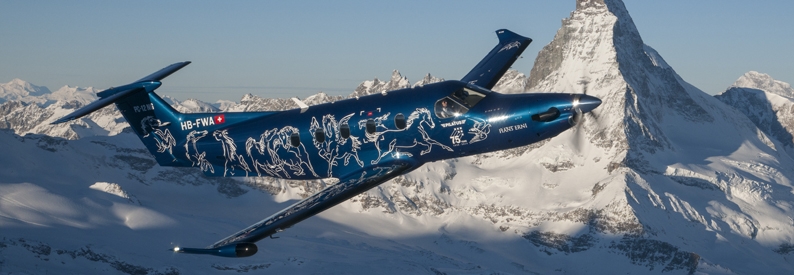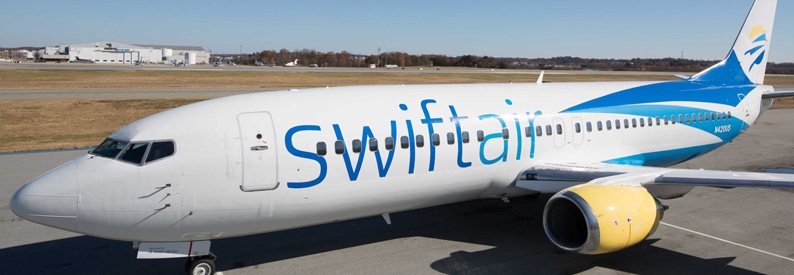Jackson Jet Center (Boise) is adding its first super-midsize jet, a Challenger 605, to offer a broader portfolio of aircraft on its charter fleet, Vice-President (Charter and Management) David J Smith told ch-aviation in an exclusive interview. Despite the expansion plans, the operator continues to see surging demand for turboprops in its home market in Idaho.
"Especially in the Phoenix market, the midsize jet category and above seems to be the bread and butter. So ideally I would like to get our fleet a little bit more robust. I'd like to have a jet in every category, from turboprop to very light jet, light jet, mid, super-mid, and heavy, to offer our clients options for all the diverse missions that they have," he outlined.
The operator's Part 135-certified fleet currently comprises two Cessna Citation Mustangs, two Cessna Citation Jet 3+, one HA-420, and three PC-12s. All eight aircraft are currently assigned to the certificate of Swift Aircraft Management, a Phoenix-based operator Jackson Jet Center acquired in 2022. Smith said the company also manages one aircraft which is not on its Part 135 certificate.
With the addition of the Challenger 605, N709BA (msn 5811), which should be on the Part 135 certificate within days, the operator will re-enter the 10+ seat market. Swift Aircraft Management used to operate two Legacy 600s but retired the last of these earlier this year.
However, Jackson Jet Center is cautious about expanding into the long-range jet segment and operating internationally. Smith said that demand for international charters is much lower than domestically. On top of that, operations to Europe require a lot of additional logistics, training, and bureaucracy, which would distract the operator from its core business.
The airline aims to have at least two aircraft of any given type in its owned fleet.
"Three is the sweet spot for us, taking into consideration crewing, manuals, maintenance oversight, part sourcing, and even just a backup for AOGs or scheduled maintenance situations. [It allows] having similar aircraft type without incurring upgrade costs, or having the downgrade situation if we only find some older aircraft off [our] fleet," Smith stated.
Jackson Jet Center currently owns four aircraft and manages the other six. In terms of its managed fleet, it is much more open to single-aircraft subfleets. Jackson Jet Center also recently launched a fractional ownership programme for the PC-12s and CJ3+.
Charter market situation
The operator's home market in Idaho is very strong, Smith said, driven by booming demand from wealthy Americans relocating, at least seasonally, to destinations such as Sun Valley and Coeur d'Alene Pappy Boyington. Also Mc Call is growing rapidly as an alternative to the crowded and increasingly exclusive real estate market in Sun Valley. The company also benefits from the sizeable oil community in eastern Idaho, served through airports like Pocatello.
Around a fifth of its retail business is generated out of Boise. Including other destinations in the state, which are all within short repositioning flights, the share increases to some 40%. Smith underlined that Jackson Jet Center has a strong competitive advantage by avoiding expensive ferry flights from airports such as Seattle Boeing Field to pick up customers in Idaho.
"At least in our region, which is primarily the Pacific Northwest, the turboprop market is massive. PC-12s, King Air 350s - those types are really big right now. With the uncertainty of what's going on with the American economy and it being an election year, pockets are very tight, and these are very economical machines which still give you that private aspect of getting where you need to be quickly and efficiently," Smith said.
The demand for turboprops is currently nearing the levels seen during the 2022 boom. In turn, demand for the operator's very light jets - the Mustangs and the HA-420 - is more seasonal, corresponding to winter and summer peaks for leisure charters. "Those times are great for those jets. They're not as consistent as the turboprops," Smith said, adding that the light jets - the CJ3+ - have "solid demand" due to their capability to serve "half-country missions" on trunk routes such as California-Chicago or Dallas.
Following the 2022 acquisition of Swift Aviation, Jackson Jet Center runs a second FBO at Phoenix Sky Harbor. Smith conceded that the charter market in Arizona is very different due to more competition and different customer profiles.
"The clientele is different, the demographic is different. Just from a per capita standpoint, there are a lot more options in Phoenix and Scottsdale than there are in Idaho as far as charter operators go," he explained. "There are a lot more jet options, so the market is much more competitive. Margin is definitely a big factor, and it's something we've had to adjust our business model to. In Boise, we can be very aggressive [with pricing]. It's not the same in Phoenix. Building relationships in Phoenix is hard. It's a massive city. Marketing strategies are expensive."
The Arizona market has a much stronger demand for midsize and heavy jets. With the incoming Challenger 605, the operator hopes to increase its share in the Phoenix market.
While charter demand is currently at its highest since the Covid peak, the economic situation in the US impacts other services, including jet cards and fractional ownership.
"Anything that requires a big capital upfront investment has become a much more difficult sale this year than it previously has. The 25-hour jet card commitment, the eighth share of a PC-12, those big capital investment-type aspects have definitely dwindled. And the same thing goes for managed aircraft leads," Smith outlined. He opined that the downturn has primarily been related to inflation and recession worries, which make the customers "cash-conscientious".
Customer strategy
Jackson Jet Center offers its customers the entire suite of business aviation services, including aircraft charter, management, and maintenance, among others. With its two FBOs, it has "dabbled in real estate" and aims to be a "one-stop shop," Smith said.
"Our ideal avatar is an aircraft owner that we fully service and take care of everything, including parts, maintenance, charter, hangar, fuel. But then we also have our a la carte strategies as well. Obviously, not everyone needs a full turnkey solution," he explained.
While the operator is considering growing its fleet, it has no plans to rapidly increase its customer base. Smith said building close relationships with retail customers is very important, and Jackson Jet Center wants to retain a size that allows it to know them well. It wants to build on these relationships to increase its share of direct customers. Currently, around 60% of its charters are sold via brokers and jet card companies. Smith said the target ratio is in the range of 70/30 in favour of direct bookings.
Supply chain constraints
Smith conceded that the operator had been affected by supply chain issues, although their severity varies among the manufacturers.
"The big impact is parts sourcing. A maintenance event that used to take four weeks is now taking 12 because we can't source a part, and that's where we've seen the biggest pinch. Outside of that, honestly, we're very lucky with the parts department and an in-house maintenance team to help get ahead of [these issues]," he said.
The situation is not really improving and has a noticeable impact on aircraft utilisation with much longer downtimes. Smith assessed that part of the problem is the limited interest of manufacturers in supporting out-of-production types as "a little bit of an intentional drive to push people towards new aircraft."
The labour market is equally constrained, and Smith stressed that difficulties in sourcing pilots are overarching and not limited to smaller metros like Boise. This is largely due to the limited supply of young pilots, while large scheduled carriers attract those that are on the market. However, mechanics are even more difficult to hire, which worries the operator.
"This pool is very, very small, and that's really concerning because that's what causes downtime. That's what's going to put operators out of business. If you can't get your aircraft fixed, or you don't have a qualified person to work on a certain type of aircraft that you own or operate, your aircraft is then a multi-million dollar paperweight," Smith said.


